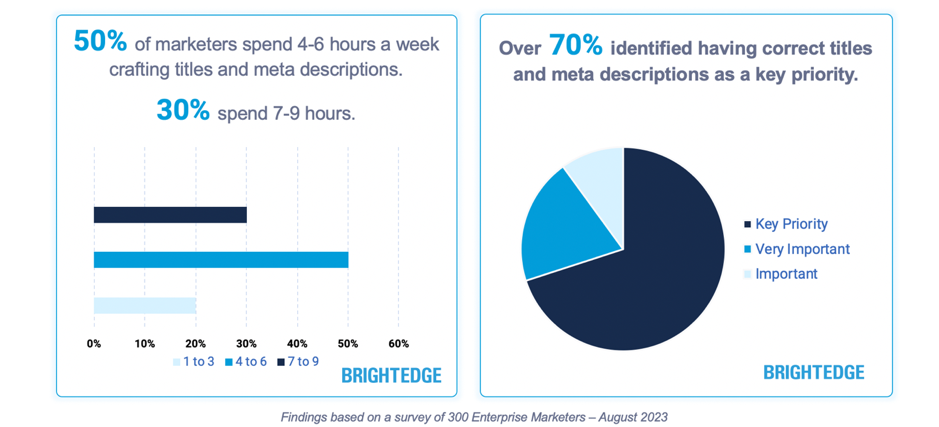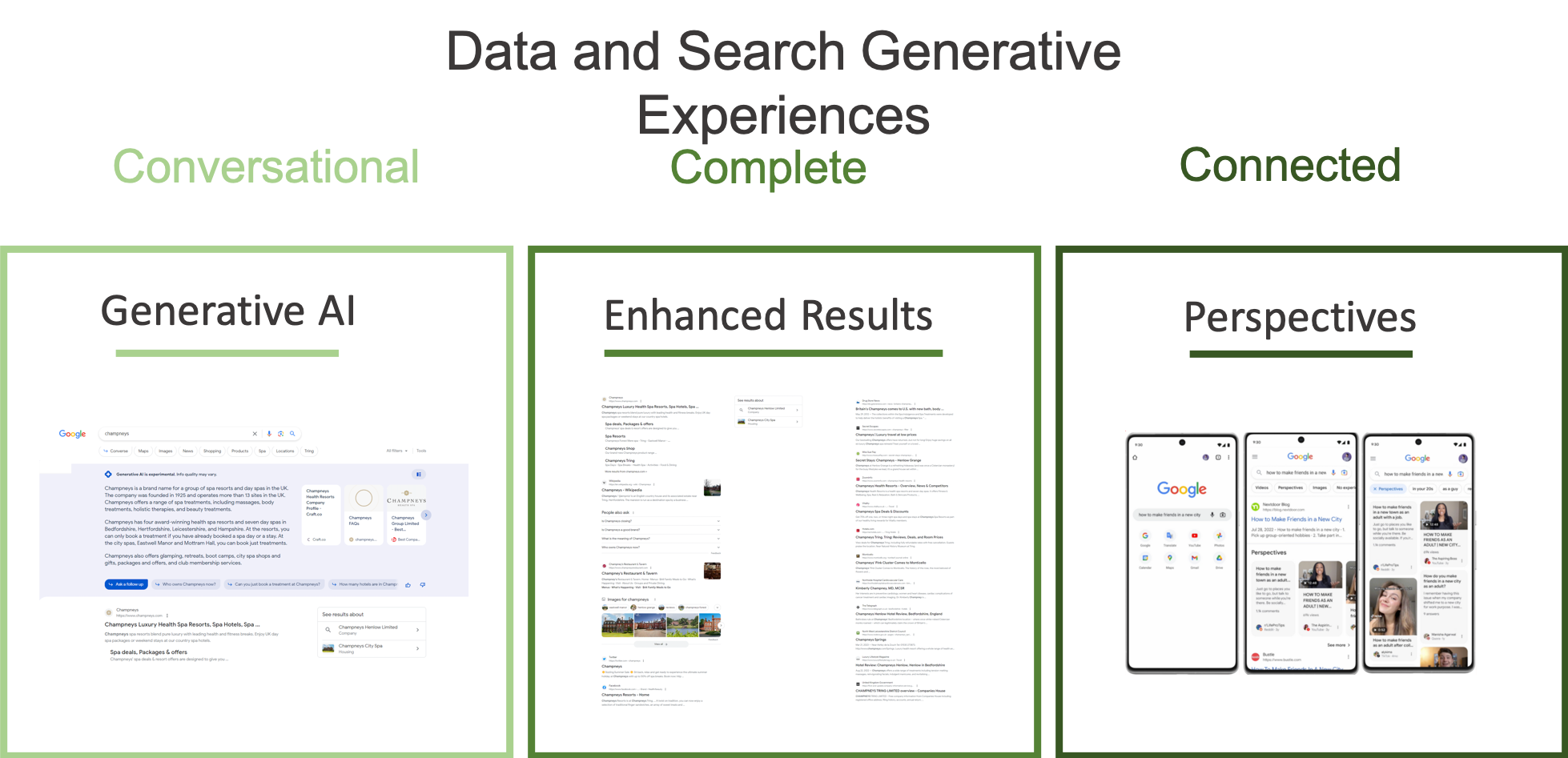Data is the lifeblood of search.
The remarkable evolution of AI and the introduction of generative AI has been built on data foundations.
However, the success of any innovation, product, or technological advancement boils down to the quality of that data. Utilizing the correct data is essential when connecting generative AI, search, and content marketing.
Data is exploding, with the IDC projecting that the size of global data will reach 175 zettabytes by 2025.
This is twice the amount produced last year, signaling a significant growth trend. I actually predict more!
To adapt to this data boom, professionals utilizing generative AI must evaluate their data sources and identify the most valuable functionalities for the future.
Poor Vs. Quality Data
The detrimental impact of poor data on businesses is undeniable.
Poor-quality data is the root cause of operational disruptions, inaccurate insights, and poor decision-making.
According to a report by Gartner in 2021, organizations suffer an average annual cost of $12.9 million due to bad data quality.
In the past, data quality efforts were primarily focused on structured data in relational databases.
However, marketers now face new challenges with the rise of big data systems, cloud computing, and unstructured data types like text and sensor data. Managing data quality across cloud systems has become essential.
In search and content marketing, data has never been so important. However, 57% of marketers misinterpret data, resulting in costly mistakes.
This can result from that data via disparate data sources and the related problems with processing large data sets at scale
What Is Quality Data?
Quality data combines crucial factors such as accuracy, connectivity, completeness, and reliability.
The accuracy of the data you use defines success in search – ensuring executives, content, digital, product, marketing, and sales departments are equipped with accurate information is essential.
Reliable data is driving increasingly intelligent search decisions that impact business performance.
Additionally, quality data management plays a central role in connecting the dots between SEO and Content marketing performance.
In addition to accuracy, several other dimensions contribute to good data quality, including:
- Completeness: Data sets should contain all the necessary data elements.
- Consistency: Data values across different systems or data sets should not conflict.
- Uniqueness: Duplicate data records should be avoided in databases and data warehouses.
- Timeliness: Data should be regularly updated to remain current and readily available.
- Validity: Data should contain the expected values and follow proper structure.
- Conformity: Data should adhere to the standardized formats established by your organization.
By meeting these factors, data sets become reliable and trustworthy and align with data governance efforts to ensure consistent and effective data usage across organizations.
Data, Search, And Generative AI
A combination of humans and machines creates a data and content marketing battleground where quality and connectivity are crucial to success.
The adoption of AI tools, machine learning applications, real-time data streaming, and complex data pipelines has further complicated the data quality process.
Compliance with data privacy and protection laws, such as GDPR and CCPA, has increased the demand for accurate and consistent data.
While the volume of global data grows exponentially, at the same time, SEO is changing as consumer demands continue to evolve, and search engines cater to these changes by creating new experiences and experimenting with the integration of AI in search engine results pages (SERPs).
As a result, marketers need to carefully reconsider their approach to data, technical SEO, and generative AI outputs.
Data Inputs And Generative AI Outputs
The quality of generative AI outputs depends on the quality and connectivity of the data that feeds it.
Many of you will have experienced this, especially in the early days of generative AI and ChatGPT, Bing AI, and Google Bard.
This is why we see more and more prompt engineering and fine-tuning of data from large language models (LLM).
Generative AI, along with tools like ChatGPT and Google Search Generative Experiences (SGE), has been the subject of much discussion.
Generative AI based on quality data analysis is already saving time and efficiency for SEO pros.
 Image from author, August 2023
Image from author, August 2023Generative AI can help SEO and content marketers complete repetitive tasks at a faster pace and with accuracy.
Over 98% of our customers are saving valuable time crafting SEO titles and descriptions utilizing BrightEdge Copilot (Disclosure: my company).
However, the value of quality data feeding generative AI also extends beyond time savings.
By utilizing quality data, marketers can enhance their understanding of consumer and conversational intent (the key to generative AI results in the SERPS) and understand datasets by incorporating external industry classification data, ultimately reducing processing times.
Additionally, generative AI can create training and synthetic data sets to support the further development of AI and machine learning models.
However, this evolution does call for marketers to adjust their approach to data and ensure;
- Quality and Connectivity of Data: AI outputs are only as good as the inputs. Ensure the sources you use are complete and combine historical and real-time data. Avoid multiple disparate data sources that give an incomplete picture of your consumer behavior to avoid GIGO – Garbage In, Garbage Out.
- Integration into Enterprise Data Strategy: Generative AI should be considered an integral part of the data strategy. Ensure its inclusion from the outset and align it with your broader enterprise marketing goals.
- Proactive Challenge Addressing: Proactively address security, bias, and accuracy challenges specific to generative AI. Assessing and mitigating these risks is essential for successful implementation and future compliance issues.
- Focusing on Analytics Cycle Components: The initial adoption of generative AI should target specific components of your marketing campaigns and specific use cases. Testing outputs continuously to ensure applications work and guarantee success, especially when outputs are being produced at scale.
- Prioritizing Business Impact: Prioritize programs that drive measurable business impact to your campaigns. Ensure any technologies you use are tried and tested, and innovations in generative AI are validated and backed by foundational quality, high-fidelity data sets.
Moving Forward With Data In SEO
When looking at how AI impacts SEO, it’s good to consider that every webpage has human and machine visitors: people seeking relevant content that answers their questions and needs and search engine spiders or bots analyzing technical content.
Data processing has become indispensable for assessing site content and informing digital strategies.
SEO marketers are now inundated with incremental data additions that can be overwhelming to decipher. We are fortunate that AI and automation in SEO are not new, and automated technologies can reduce manual data efforts and improve business decision-making such as;
- Collecting and structuring big data to generate smaller, more valuable, actionable insights.
- Improving tasks like data classification, tagging, and cleansing.
- Online research, site auditing, and intent modeling.
- Uncovering valuable insights into how consumers are interacting with search engines.
This also helps marketers who lack the necessary degrees or experience in data science to do this effectively.
Marketers who leverage data correctly can adapt to changing consumer expectations, keep up with granular search changes, and meet Google standards.
Utilizing a combination of unique knowledge and high-fidelity data (propriety) is crucial for staying competitive and ensuring that AI applications are successful on solid data foundations.
Marketers can harness the power of data to extract meaningful insights from the noise.
For example, retail marketers can uncover the issue of duplicate content, while marketers in banking can focus on concise content. Tailored best practices and industry-specific problem-solving give marketers a competitive edge.
This all helps create better, faster search experiences.
 Image created by author, September 2023
Image created by author, September 2023Conclusion
Many SEO pros still do not fully utilize the value of data due to its overwhelming complexity. However, with the help of advanced AI, these hidden insights can be uncovered and understood.
By harnessing the power of AI-first technologies, marketers can optimize their content for maximum impact across multiple digital channels, adapting to changing technologies and consumer behavior.
As organizations forge ahead with their generative AI strategies, it is vital to remember the success of applications relies on the data that feeds it.
Ensure quality and connective data are central to your AI roadmap. Without it, success will be limited.
More resources:
Featured Image: 3rdtimeluckystudio/Shutterstock

